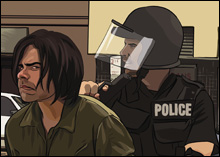
IS TIME ILLUSORY? And does Linklater keep making the same movie? |
One of Philip K. Dick’s conceits — it’s referred to in Richard Linklater’s Waking Life — has it that time is illusory and we are all poised in one instant, which he suggested was some time in AD 50. To judge from A Scanner Darkly and Linklater’s film adaptation, that instant seems more like some time in the ’70s. The book, written in 1977 and set in the near future, describes a world that sounds like 1977. The movie, made last year and set “seven years in the future,” looks and feels like 1977. Is it always 1977?“Maybe if you’re Philip K. Dick or myself,” says Linklater on the phone from LA, where he’s promoting the movie. “But that look of broken-down cars . . . I don’t think anything changes too much in a certain stratum of dropouts. It always looks like a perpetual hangover from the ’60s.”
The time might be the ’70s, but the place is mostly Austin, Texas, though the film is set in Orange County, California. “We did some shooting in Anaheim, like the highways, but it was mainly second-unit stuff. But most of it was shot in Austin [Linklater’s home town]. I tried to make Austin look like Anaheim, which was fairly easy. I had a lot of palm trees, and we took brick walls and made them stucco.”
I recall an interview I had with Linklater back in 2001 for Waking Life in which he explained how the street corner at which a character is dropped off in that film is the same Austin street corner at which a character is dropped off in his first film, Slacker (1991). Does the same corner pop up in Scanner? Aren’t Slacker, Waking Life, and A Scanner Darkly all the same move?
“Really?” he says, skeptical. I persevere. Certainly the three films have elements in common, a community of outsiders, rampant paranoia . . .
“I guess that’s right,” Linklater relents. “There’s an air of . . . something. Certain communal aspects, I guess. What attracted me to it was that I felt like I knew these people. I was like, ‘I think I have roommates like this,’ you know.”
He proves more forthcoming when discussing the film’s real life rather than its metaphysical ramifications. I mention that the “terror cell” recently trapped in Florida by an undercover FBI agent sounded like Scanner’s band of misfits.
“Could have been our guys. A big bust. A bunch of losers hanging out in their house.”
Should we look at Scanner as a political movie?
“The book felt very contemporary to me four or five years ago, when I was first getting going on it. But it’s even more relevant today. That’s a tribute to Philip K Dick. He was coming out of the Nixonian paranoid Vietnam era with a really secretive government that was aggressive in its tactics against citizens that it perceived as enemies. And I think he saw how technology would be used to further that. He kind of imagined this drug war in the Orwellian sense, this perpetual drug war. And then it’s easy to glom on the War on Terror.